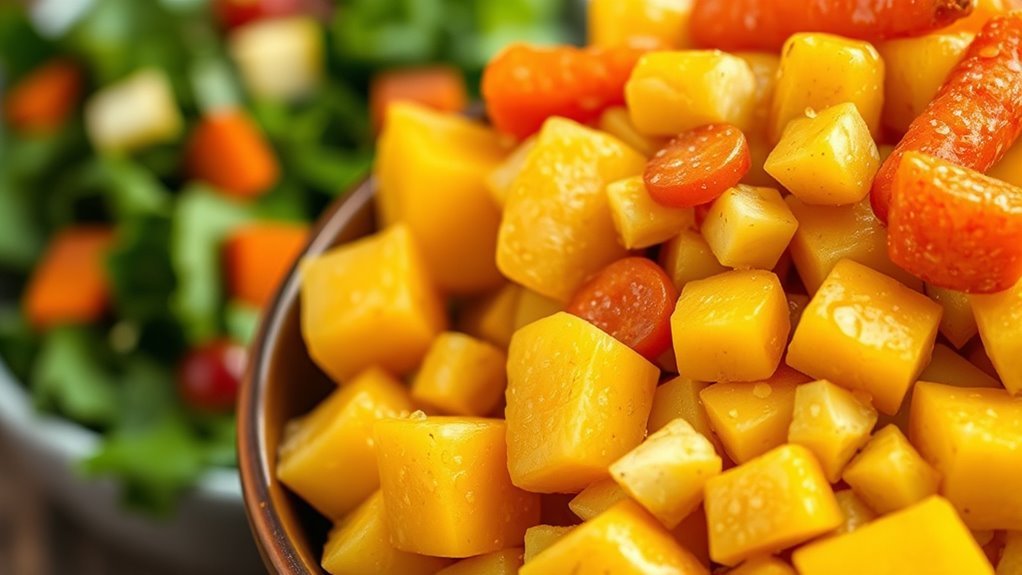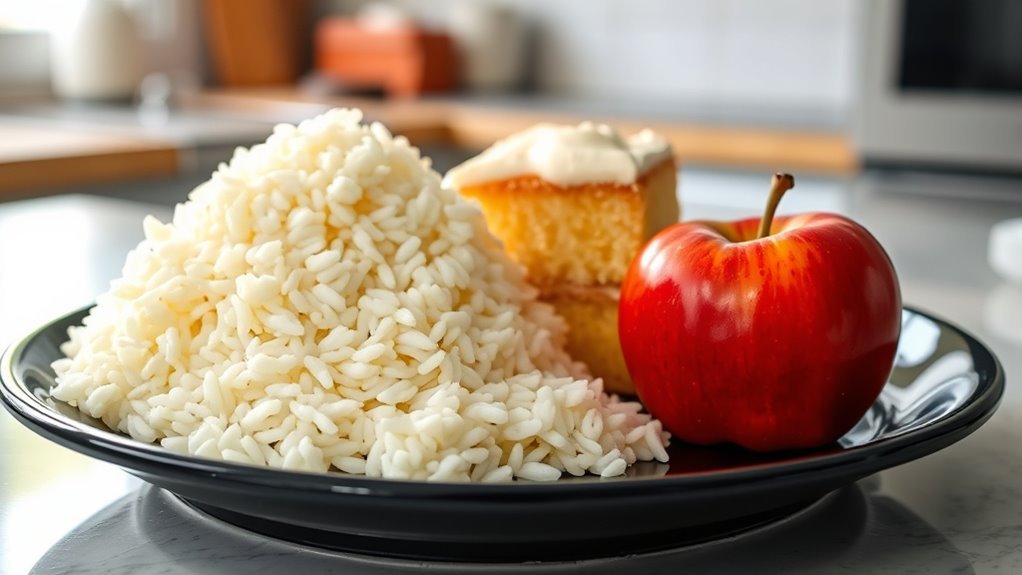On a keto diet, you should avoid sugary foods and beverages, grains, starchy vegetables, high-sugar fruits, processed foods, legumes, and certain condiments. These items can disrupt ketosis and lead to weight loss stalls. Stay away from alcoholic drinks high in carbs and be cautious with artificial sweeteners, as they might trigger cravings. By making informed food choices, you can better maintain your progress and discover more guidelines that support your keto lifestyle.
Sugary Foods and Beverages

When you’re following a ketogenic diet, it’s crucial to steer clear of sugary foods and beverages, as they can quickly derail your efforts to maintain a state of ketosis. Sugar cravings can hit hard, but understanding your beverage choices can make a significant difference. Opt for water, herbal teas, or black coffee instead of sugary sodas or fruit juices. These alternatives won’t spike your insulin levels and will help keep you hydrated without unnecessary calories. Additionally, consider using sugar substitutes like stevia or erythritol to satisfy your sweet tooth without compromising your diet. By being mindful of what you consume, you’ll empower yourself to enjoy the freedom of a successful ketogenic lifestyle, keeping those sugar cravings at bay.
Grains and Grain Products

Sugar isn’t the only culprit that can hinder your progress on a ketogenic diet; grains and grain products also pose a significant challenge. Many people find that even gluten-free grains can disrupt ketosis. While whole grain alternatives might seem healthier, they still contain carbs that can stall your weight loss. Grain-based snacks often lead to cravings and can derail your efforts.
| Grain Product | Carb Content (per 100g) |
|---|---|
| Quinoa | 21g |
| Brown Rice | 23g |
| Whole Wheat Bread | 47g |
| Oats | 66g |
Consider embracing grain-free diets to truly experience the freedom of ketosis. Ditch those grains and focus on low-carb options to fuel your journey!
Starchy Vegetables

While many people associate vegetables with health and weight loss, starchy vegetables can be problematic for those on a ketogenic diet. These veggies are higher in carbohydrates, which can kick you out of ketosis. Here are some starchy vegetables to avoid:
- Potatoes
- Sweet potatoes
- Corn
- Peas
Instead, consider low-carb alternatives like cauliflower rice and zucchini noodles. They’ll help you maintain your carb limit while still enjoying satisfying meals. Sticking to non-starchy options like leafy greens, bell peppers, and broccoli can offer a wealth of nutrients without derailing your keto journey. Remember, understanding what to avoid is essential to achieving your ketogenic goals and enjoying the freedom that comes with a well-structured diet.
High-Sugar Fruits
Have you ever considered how high-sugar fruits can impact your ketogenic diet? While fruits are often seen as healthy, many contain high levels of natural sugars that can kick you out of ketosis. Fruits like bananas, grapes, and mangoes can spike your blood sugar, making it challenging to maintain your low-carb goals. Instead, you might explore keto-friendly alternatives such as berries—like strawberries, raspberries, and blackberries—which are lower in sugar and rich in fiber. These options allow you to enjoy the sweetness of fruit without compromising your diet. By choosing wisely, you can still indulge in delicious flavors while keeping your carbohydrate intake in check, preserving your freedom to enjoy a varied and satisfying diet.
Processed Foods
When it comes to the ketogenic diet, avoiding processed foods is essential—about 70% of your carb intake can come from unexpected sources. Many processed snacks are loaded with hidden additives that can sabotage your efforts. To stay on track, consider these alternatives:
- Nuts and seeds – Great for healthy fats and low in carbs.
- Cheese crisps – A crunchy, low-carb snack option.
- Vegetable chips – Look for brands with minimal ingredients.
- Hard-boiled eggs – A perfect protein-packed snack.
Low-Fat and Diet Products
Although low-fat and diet products may seem like a healthy choice, they often contain hidden sugars and additives that can derail your ketogenic goals. The low-fat myths surrounding these products can mislead you into thinking they’re keto-friendly. Instead, they can be packed with carbs that spike insulin levels.
Here’s a quick look at some common pitfalls:
| Low-Fat Product | Diet Product Pitfall |
|---|---|
| Fat-Free Yogurt | High in added sugars |
| Low-Fat Salad Dressing | Contains unhealthy thickeners |
| Diet Soda | Artificial sweeteners can affect cravings |
| Light Cheese | Often has more carbs |
| Low-Fat Ice Cream | Packed with sugars and fillers |
Choose whole, high-fat options instead to stay on track with your keto lifestyle.
Legumes and Beans
When following a keto diet, it’s important to be aware that legumes and beans are typically high in carbohydrates, which can hinder your progress. Instead of these options, you might consider alternative protein sources like meat, fish, or low-carb dairy. This way, you can still meet your nutritional needs without compromising your carb limits.
High Carb Content
While many people turn to legumes and beans for their protein and fiber content, they often overlook their high carbohydrate levels, which can be detrimental for those following a ketogenic diet. If you’re aiming for ketosis, it’s crucial to evaluate alternatives. Here are some reasons to steer clear of legumes and beans:
- High Carb Content: Most beans contain 20+ grams of carbs per cup.
- Blood Sugar Spike: They can cause insulin spikes, disrupting ketosis.
- Low Fat: Unlike keto-friendly snacks, they lack healthy fats.
- Caloric Density: Their caloric content may hinder weight loss goals.
Instead, opt for high fat cheeses or other low-carb options to maintain your keto lifestyle and enjoy the freedom it brings!
Alternative Protein Sources
If you’re looking for alternative protein sources on a ketogenic diet, it’s essential to recognize that not all options are created equal. While plant-based proteins like legumes and beans are popular, they often contain high carb levels that can hinder ketosis. Instead, consider seafood options for lean protein, or explore meat alternatives that fit your macros. Protein powders can also be a convenient choice, especially those derived from whey or casein. For dairy choices, opt for high-fat options like cheese and Greek yogurt. If you’re adventurous, insect protein offers a unique, low-carb option. Additionally, nut-based proteins and egg substitutes can round out your diet, providing essential nutrients without the carbs that legumes typically bring.
Certain Condiments and Sauces
When following a keto diet, it’s essential to watch out for certain condiments and sauces that can sabotage your efforts. Many popular options, like ketchup and barbecue sauce, are loaded with high amounts of sugar, while others may contain starchy ingredients that increase carb counts. Additionally, artificial sweeteners, often found in sugar-free sauces, can sometimes impact your body’s insulin response, so it’s wise to choose your condiments carefully.
High-Sugar Sauces
Although many sauces can enhance the flavor of your meals, high-sugar options can sabotage your keto diet. It’s crucial to be mindful of what you’re adding to your plate. Here are four high-sugar sauces you should avoid:
- Ketchup – Often packed with sugar, even the low-fat versions can be deceptive.
- Barbecue Sauce – Many varieties contain high fructose corn syrup, making them a no-go.
- High Sugar Dressings – Creamy options like ranch or honey mustard can derail your carb count.
- Marinara Sauce – Check for added sugars; many store-bought versions aren’t keto-friendly.
Starchy Condiments
While high-sugar sauces can be detrimental to your keto diet, starchy condiments also pose a significant challenge. Many popular condiments, like ketchup and barbecue sauce, contain hidden sugars and starches that can quickly derail your carb count. Instead of reaching for these options, consider keto friendly alternatives such as sugar-free ketchup or homemade sauces made from fresh ingredients. Low carb spices can elevate your meals without the added carbs, providing flavor without compromising your diet. Garlic powder, onion powder, and paprika can be great additions to your cooking. By choosing wisely and being mindful of the condiments you use, you can maintain your keto lifestyle while still enjoying delicious meals. Freedom in your choices is key!
Artificial Sweeteners
As you navigate the keto diet, it’s essential to be cautious with artificial sweeteners found in certain condiments and sauces. While they might seem like a harmless way to satisfy your sweet tooth, some types can pose health risks. Here are four common artificial sweeteners to watch out for:
- Aspartame – linked to headaches and other neurological issues.
- Sucralose – can disrupt gut bacteria and affect glucose metabolism.
- Saccharin – has been associated with potential cancer risks in animal studies.
- Stevia – while natural, some processed forms may contain additives that spike blood sugar.
Being aware of these artificial sweeteners types allows you to make informed choices that align with your health goals on keto.
Alcoholic Beverages
If you’re following a ketogenic diet, it’s essential to be mindful of your alcoholic beverage choices, as many options can derail your progress. When considering wine choices, opt for dry varieties with lower carb counts. Beer types often contain hidden sugars, so it’s best to avoid them altogether. For spirits selection, clear liquors like vodka and whiskey can be keto-friendly, but watch out for cocktail mixers that may spike your carb intake. Remember, alcohol effects can be more pronounced on keto, potentially hindering your weight loss efforts. Stay informed about what you’re consuming, and prioritize beverages that align with your goals. Being selective doesn’t mean sacrificing your freedom; you can still enjoy social occasions while staying on track.
Artificial Sweeteners
When considering artificial sweeteners on a keto diet, it’s important to be aware of hidden carbs they might contain. Some sweeteners can impact your ketosis levels, potentially derailing your progress. Understanding the types and amounts you consume can help you make informed choices that align with your dietary goals.
Hidden Carbs in Sweeteners
How can something that tastes sweet be a hidden threat to your keto diet? Many sweeteners can contain hidden carbs that might derail your progress. Here are four key points to contemplate:
- Sugar Alcohols: While they’re lower in calories, they can still impact your net carbs, causing fluctuations in your blood sugar.
- Natural Sweeteners: Not all are created equal; some can have hidden sugars you might overlook.
- Sweetener Types: Different types have varying effects on your body, so it’s essential to know what you’re using.
- Flavor Enhancers: These often contain hidden carbs that can add up quickly.
Stay vigilant about what sweeteners you choose, as their hidden carbs can greatly affect your keto journey.
Impact on Ketosis Levels
While artificial sweeteners may seem like a keto-friendly alternative to sugar, their impact on ketosis levels can be more complex than you might think. Some studies suggest that certain sweeteners can trigger insulin responses, which may hinder ketosis maintenance. This means that even though you’re avoiding sugar, you might still face challenges in achieving or maintaining your desired ketosis state. Additionally, if you’re practicing carb cycling, the inclusion of artificial sweeteners could complicate your body’s ability to shift in and out of ketosis smoothly. It’s essential to monitor how these sweeteners affect your individual response and overall goals. Ultimately, staying informed and aware can help you make choices that align with your keto lifestyle while maintaining your freedom to enjoy food.
Frequently Asked Questions about What Not to Eat on Keto
1. What types of carbohydrates should I avoid on a keto diet?
On a keto diet, you should avoid high-carb foods such as bread, pasta, rice, and grains. This includes whole grains, as they still contain too many carbohydrates to fit within a typical keto meal plan. Sugary foods and beverages, including candy, soda, and fruit juices, are also high in carbohydrates and should be eliminated. Instead, focus on low-carb vegetables and healthy fats to maintain ketosis.
2. Are there any fruits I can eat on a keto diet?
While many fruits are high in sugar and should be avoided, there are a few low-carb options that you can include in moderation. Berries, such as strawberries, raspberries, and blackberries, are lower in carbohydrates compared to other fruits and can be enjoyed in small amounts. However, fruits like bananas, apples, and grapes should be avoided due to their high sugar content, which can disrupt ketosis.
3. Can I eat processed foods on a keto diet?
Many processed foods are not suitable for a keto diet due to hidden sugars and unhealthy fats. Items like snack bars, sauces, and pre-packaged meals often contain ingredients that can spike your carbohydrate intake. It’s crucial to read labels carefully and avoid foods that have added sugars, refined flours, and unhealthy oils. Opt for whole, unprocessed foods whenever possible to maintain the integrity of your keto diet.
4. Should I avoid dairy products on keto?
Dairy can be a part of a keto diet, but you should choose full-fat, low-carb options. Avoid products like milk, which contains lactose (a sugar), and opt for heavy cream, cheese, and unsweetened yogurt instead. Some individuals may be sensitive to dairy and may need to limit or avoid it altogether. It’s best to monitor how your body reacts to different dairy products while on a keto diet.
5. What about alcohol on a keto diet?
Alcohol can be tricky on a keto diet. Many alcoholic beverages, especially cocktails and sweetened drinks, are high in sugars and carbohydrates. Beer is also typically high in carbs. However, options like dry wine or spirits mixed with sugar-free mixers can be lower in carbs. It’s important to consume alcohol in moderation and be aware of how it affects your ketosis and overall health.
References
- https://www.healthline.com/nutrition/keto-diet-foods-to-avoid
- https://www.webmd.com/diet/what-to-eat-on-keto-diet
- https://www.medicalnewstoday.com/articles/323673
- https://www.ncbi.nlm.nih.gov/pmc/articles/PMC6464357/
- https://www.cdc.gov/healthyweight/healthy_eating/index.html
- https://www.nutrition.gov/topics/nutrition-101/healthy-eating
- https://www.khanacademy.org/science/ap-biology/cellular-respiration/energy-in-cells/a/what-is-the-ketogenic-diet
- https://www.bbc.com/news/health-50450367


